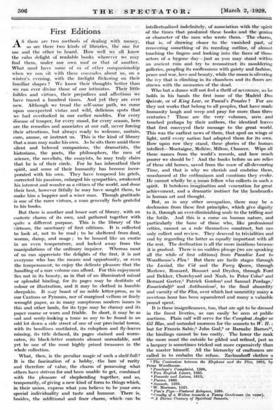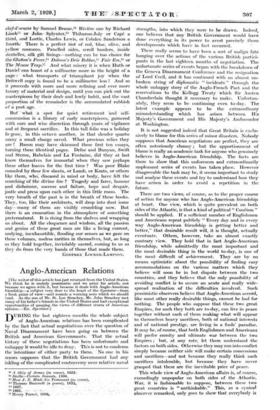First Editions
AS there are two methods of dealing with money, so are there two kinds of libraries, the one for itse.. and the other to hoard: How well we all ..know the calm delight of readable books wherever we may find them, under our own roof or that of another. What need have some of us of other companionship when we can sit with these comrades- about us, on a winter's evening, with the firelight fliekering on their familiar .shapes ? We know their thoughta better than we can ever divine. those of our intimates.Their little foibles and virtues, their prejudices and affeetioni we have traced a hundred times. And yet they are ever new. Although we tread the self-same path, we come upon unexpected vistas and wild, delicious spots that we had overlooked in our earlier rambles._ For every disease of temper, for every mood, for every season, here are the remedies and associates at our call, never forcing their attentions, but always ready to welcome, sustain, cure, amuse, or instruct us. This is the kind of library that a man may make his own. As he sits there amid these silent and beloved companions, the dramatists, the historians, the poets, the philosophers, the men of science, the novelists, the essayists, he may truly claim that he is of their circle. For he has inbreathed their spirit, and some of their humanity has become incor- porated with his own. They have tempered his griefs, corrected his passions, enlarged his sympathies, awakened his interest and wonder as a citizen of the world, and done their best, however fitfully he may have sought them, to • make him a happier and a wiser man. Though gratitude • is one of the rarer virtues, a man generally feels grateful to his books. - But there is another- and lesser sort of library, with an esoteric charm of its own, and gathered together with quite a different purpose. This is the library of the 'virtuoso, the sanctuary of first editions. it is collected to look at; not to be read; to be sheltered: from dust, worms, damp, and usage ; to be housed like an exotic in an even temperature, and locked away from the manipulations of the ordinary inquirer. Whereas most of us can appreciate the delights of the • first, it is not everyone 'who has the means-and opportunity, or even -the temperament; to enjoy the delicate pleasure that-the .handling of a rare volume can afford. For this enjoyment • lies not in its beauty, as in that of an illuminated missal or splendid binding, for its pages may be destitute of colour or illustration, and it may be. clothed. in humble sheepskin. It may boast of no noble letter-press, as in our Caxtons or Pynsons, nor of margined vellum or finely wrought paper, as in many sumptuous modern issues •in this and other lands, for its type may be clumsy and its paper coarse or worn and friable. In short, it may be as sad and seedy-looking- a tome as any to be found in an odd-lot down-a side street of one of our provincial towns, with its headlines mutilated, its colophon and fly-leaves missing, its title defaced, its pages stained and :Worm- eaten, its black-letter contents almost unreadable, and yet be one of the most highly prized treasures in the whole collection.
- What, then, is the peculiar magic of such a shelf-full? It is the fakinatiort of a hobby, - the lure of rarity and therefore of value, the charm of possessing what others have striven for and been unable tO get, combined with the pleasure of shepherding together, and so, temporarily, of giving a new kind of form to things which, in their union, express what you believe to be your own special individuality and taste and humour. There is, besides, the additional and finer charm, which can be intellectualized indefinitely, of association with the spirit of the times that produced these books and the genius or character of the men who wrote them. The charm, that is; of drawing- closer to the vanished past, of recovering something of its receding outline, of almost touching the fingers and looking into the faces of those actors of a bygone day----just as -you may stand within an ancient ruin and try to reconstruct its mouldering galleries,-peopling its rooflessness with gaiety and fashion, peace and war, love and beauty, while the moon is silvering the ivy that is climbing in its chambers and its floors are strewn with the memories of the dead. • - . Who but a dunce -will not feel a thrill of reverence, as he holds in his hands .the first issue of the Madrid Don Quixote, or of King Lear, or Pascal's Pensees? For are they not works that belong to all peoples, that have made humanity laugh and weep and pray for more than three centuries ? These are the very volumes, seen and touched perhaps by their authors, the identical leaves that first conveyed their message to the great world. This was the earliest news of them, that sped on wings of light, until every nation had adopted them for its own. RoW upon row they stand, these glories of the human intellect—Montaigne, Moliere, Milton, Chaucer. Wipe all these names from the world's records, and how much poorer we should be ! And the books before us are relies of -these old heroes, saved from the maw of all-devouring Time, and that is why we cherish and enshrine them, unashamed at the enthusiasm and emotions they evoke. He cannot wholly be a mean fellow who collects in such a spirit. It betokens imagination and veneration for great achievement, and a dramatic instinct for the landmarks in human art and thought.
But, as in any other occupation, there may be a declension from these first principles, which give dignity to it, through an ever-diminishing scale to the trifling and the futile. And this is a curse on human nature, and particularly the bane of those who, like professional critics, cannot as a rule themselves construct, but can :only collect and review. They descend to trivialities and end by regarding the latter as equally important with all the rest. The declination is all the more insidious because it is gradual. There is no sudden_ plunge (we are speaking all the while of first editions) from Paradise Lost to Woodhonse's Flea.' But there are facile stages through the Lusiad, the Cid and the Faery Queen, through Marlowe, Ronsard, Bossuet - and Dryden, through Ford and Dekker, Churchyard and Nash, to Peter Colse8 and Bernard Garter,3 Patrick Gordon' and Samuel Pordage,5 Emariedulfe and Antibossicon7, to the final absurdity and vacuity of the Flea, Over which last nonentity many a -covetous hour has been squandered -and many a valuable Pound spent.
- - It is theie insignificances, too, that are apt to be dressed in the finest liveries, as can easily be seen at public auctions. Plain calf will serve for the Compleat Angler or Gil Bias, and untooled morocco for the sonnets to W. II. ; but for Francis Sabie,8 John God,° or Barnabe Barnes"', the bindings cannot be too costly. The lower the rank the more must the outside be -gilded and -refined, just as a lacquey is sometimes tricked out more expensively than the master himself. All the hierarchy of craftsmen are called in to embalm the refuse. Zaehnsdorff clothes a The Contention between the Elephant and the Plea, 1805, by Peter Woodhouse.
2 Penelopea Complaint, 1596, 3 Two English Lovers, 1565. Penardo and Laissa, 1615. 6 Poems, 1660. Sonnets, 1595. W. Horman, 1521. 8 Pan's Pipe—Pastoral Eclogues, 1595. 'Cruelly of a Widow towards a Young Gentleman (in verse). 1,7A Divine Century of Spiritual Sonnets, _ = the d'oeuvre by-Samuel- Brasse,u. RiVibe one by Itichani Linchu Or John, Splynter,13' Thibaron-Joly or Cape a third, and Lortic, Charles Lewis, or Cobden Sanderion a fourth: There is a perfect riot of red, 'blue, olive,- and yellow morocco. Panelled sides, scroll • borders, inside dentelles; silk gilt liningsnothing can be too choice for the Glutton's Feoer,14 Dobson's Drie Bobbes,16 Fair Ent," or The Mouse Trap 17 -And what misery it is when Huth or Daniel 'can boast of a millimetre more in the height of a page :' what transports of triumphant joy when the Britwell copy is found to be a millimetre less ! And -so it proceeds with more and more • refining and ever more luxury of material• and design; until you can pick -out the masterpiecei by their drab and lowly habit, and the vast proportion of- the remainder is the accumulated rubbish of a past age.
But what a spot for quiet retirement and -Self- communion is a library of early masterpieces, gainered with care and wise discretion through years of vigilance and at frequent sacrifice. In this tall folio was a holiday fo lone, in this octavo another, in that slender quarto many small charge saved. What precious relics they are ! Bacon May have skimmed these first ten essays, turning these identical pages. Defoe and Banyan, Swift and Sterne, Rabelais and La Fontaine, did they at last know themselves for immortal when they saw perhaps these other leaves for the first time ? Was poor Blake consoled by these few sheets, or Lamb, or Keats, or others like them, who; diseased in mind or body, have felt the scorChing-Of the diVint fire ? Tiakedy and farce, honour and dishOnenr, success and &Hutt, hope and despair, jostle and press upon each other in this little room. The very breath of the past is in the breath of these books. They, too, like their architects, will drop into dust Some dayinany of them are visibly crumbling now. But there is an emanation in the atmosphere of something preternatural. It is rising from the shelves and wrapping us about. All the eloquence and wisdom, all the passion and genius of these great men are like a living current, undying, inexhaustible, flooding our senses as we gaze on these volumes, useless rarities in themselves, bat, so long as they hold together, inviolably sacred, coming to us as they do from the very hands of those that made them. GODFREY LOCKER-LAMPSON..

























































 Previous page
Previous page